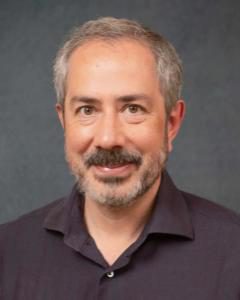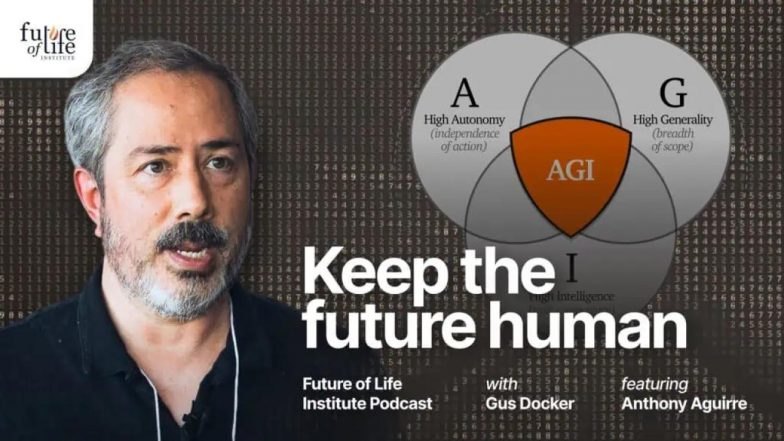Summary
Anthony Aguirre (born 1973) is a theoretical cosmologist. Aguirre is a professor and holds the Faggin Presidential Chair for the Physics of Information at the University of California, Santa Cruz.
He is the co-founder and associate scientific director of the Foundational Questions Institute and is also a co-founder of the Future of Life Institute. In 2015, he co-founded the aggregated prediction platform Metaculus with Greg Laughlin. In 2019, he published the pop science book Cosmological Koans.
Future of Life Institute – 13/03/2025 (01:21:00)
OnAir Post: Anthony Aguirre
News
Introduction
We must not build AI to replace humans.
Humanity is on the brink of developing artificial general intelligence that exceeds our own. It’s time to close the gates on AGI and superintelligence… before we lose control of our future.
Go to the website for interactive summary, video, and essay or go to this section in this post.
About
Bio on FLI
 Anthony is the Executive Director & Secretary of the Board at the Future of Life Institute, and the Faggin Presidential Professor for the Physics of Information at UC Santa Cruz. He has done research in an array of topics in theoretical cosmology, gravitation, statistical mechanics, and other fields of physics. He also has strong interest in science outreach, and has appeared in numerous science documentaries. He is a creator of the science and technology prediction platform Metaculus.com, and is founder (with Max Tegmark) of the Foundational Questions Institute.
Anthony is the Executive Director & Secretary of the Board at the Future of Life Institute, and the Faggin Presidential Professor for the Physics of Information at UC Santa Cruz. He has done research in an array of topics in theoretical cosmology, gravitation, statistical mechanics, and other fields of physics. He also has strong interest in science outreach, and has appeared in numerous science documentaries. He is a creator of the science and technology prediction platform Metaculus.com, and is founder (with Max Tegmark) of the Foundational Questions Institute.
Source: FLI webpage
Bio on Santa Cruz website
Physicist Anthony Aguirre studies the formation, nature, and evolution of the universe, focusing primarily on the model of eternal inflation—the idea that inflation goes on forever in some regions of universe—and what it may mean for the ultimate beginning of the universe and time. He is the co-founder and associate scientific director of the Foundational Questions Institute, which supports research on questions at the foundations and new frontiers of physics and cosmology. Anthony is also a co-founder of the Future of Life Institute, an organization aiming to increase the probability that life has a future, and of Metaculus, an effort to optimally aggregate predictions about scientific discoveries, technological breakthroughs, and other interesting issue.
Source: Santa Cruz webpage
Web Links
Media
The cosmic now (essay)
Source: Aeon website
Anthony Aguirreis a professor of physics at the University of California, Santa Cruz, and the associate scientific director of the Foundational Questions Institute, a nonprofit organisation that he co-founded and co-runs. His most recent book is Cosmological Koans: A Journey to the Heart of Physical Reality (2019).
Edited byPam Weintraub
2,200 words
REPUBLISHING NOT PERMITTED
Email
Save
Post
Share
One afternoon some years ago, I was walking through the snow thinking about other universes. More specifically, I was turning over in my mind the fact that the hospitality provided by our universe depends on many extremely special things. For example, if the electric repulsion between protons in the nuclei of atoms were just a bit stronger, then those atoms, and hence chemistry, and hence life itself, could not apparently exist. And there are many other such ‘coincidences’. I had convinced myself that there were four – and pretty much only four – possible explanations for the fact that the laws of physics seem to be carefully chosen to allow us living, conscious beings to be here.
First, perhaps the laws of physics really were designed for us: when the universe began, it (or some superbeing that created it) had us – or at least life – in mind. Second, perhaps it was just an immense coincidence: there was one ‘roll of the dice’ that specified, among other things, the force between protons, and we just got colossally lucky. Third, it could be that many ‘universes’ exist with different laws of physics, and we are perforce in one of the universes that allow life. Fourth, perhaps the coincidences are illusory: perhaps life would somehow find a way to arise in any universe, with any possible set of physics.
A feeling grew in the pit of my stomach that the Universe really is a pretty mysterious place. The mystery is not about why the Universe has some particular properties rather than others, but about the connection between those properties and our very existence as living, conscious beings contemplating those properties. Not only are you intimately connected to the Universe on the largest scales, you are central. This is not to deny that you are in some sense an infinitesimal arrangement of dust on one small planet out of billions of trillions in our observable universe, which might well be one of many universes. But you are also a giant: a thinking, conscious being responsible for giving meaning, and even existence, to the universe you inhabit.
Cosmology, Zen, Entropy, and Information (Podcast)
Source: Sean Carroll website
Cosmologists have a standard set of puzzles they think about: the nature of dark matter and dark energy, whether there was a period of inflation, the evolution of structure, and so on. But there are also even deeper questions, having to do with why there is a universe at all, and why the early universe had low entropy, that most working cosmologists don’t address. Today’s guest, Anthony Aguirre, is an exception. We talk about these deep issues, and how tackling them might lead to a very different way of thinking about our universe. At the end there’s an entertaining detour into AI and existential risk.
Kraw Lecture Series: Where Did it All Come From, and Where is it All Going?
Source: https://www.youtube.com/@ucsantacruz
The physical universe, Anthony Aguirre will argue, is made of matter (or energy) and of order (or information). Aguirre will trace the 13.8 billion year history of this matter/energy told by modern cosmology, as it has developed into ever-more sophisticated order and structure: galaxies and their arrangement, stars, planets, life, and very recently and locally, civilization. The survival of civilization—and life itself—through the coming century is not assured, but if it continues, what could its future look like over thousands or millions of years? No one knows, but touring topics from fundamental physics to the nature of intelligence, Aguirre will lay out some of the possibilities.
Keep the Future Human
Website
Source: Future of Life Instittue
We must not build AI to replace humans.
Humanity is on the brink of developing artificial general intelligence that exceeds our own. It’s time to close the gates on AGI and superintelligence… before we lose control of our future.
Essay
Source: FLI Website
Video
Source: Future of Life Institute
On this episode, I interview Anthony Aguirre, Executive Director of the Future of Life Institute, about his new essay Keep the Future Human: https://keepthefuturehuman.ai AI companies are explicitly working toward AGI and are likely to succeed soon, possibly within years. Keep the Future Human explains how unchecked development of smarter-than-human, autonomous, general-purpose AI systems will almost inevitably lead to human replacement. But it doesn’t have to. Learn how we can keep the future human and experience the extraordinary benefits of Tool AI… Timestamps: 00:00 What situation is humanity in? 05:00 Why AI progress is fast 09:56 Tool AI instead of AGI 15:56 The incentives of AI companies 19:13 Governments can coordinate a slowdown 25:20 The need for international coordination 31:59 Monitoring training runs 39:10 Do reasoning models undermine compute governance? 49:09 Why isn’t alignment enough? 59:42 How do we decide if we want AGI? 01:02:18 Disagreement about AI 01:11:12 The early days of AI risk
More Information
Wikipedia
Contents
Anthony Aguirre (born 1973) is a theoretical cosmologist.[1] Aguirre is a professor and holds the Faggin Presidential Chair for the Physics of Information at the University of California, Santa Cruz.[2] He is the co-founder and associate scientific director of the Foundational Questions Institute[3] and is also a co-founder of the Future of Life Institute.[4][5][6][7] In 2015, he co-founded the aggregated prediction platform Metaculus with Greg Laughlin. In 2019, he published the pop science book Cosmological Koans.[8][9]
Early life and education
Aguirre was born on July 23, 1973.[10] He received a B.S. in Mathematics/Physics from Brown University in 1995, an M.S. in Astronomy from Harvard University in 1998 and a Ph.D. in Astronomy from Harvard University.[1][2]
Career
His research has focused on various topics in theoretical physics including early universe, inflation, the foundations of quantum mechanics, foundations of statistical mechanics, gravity physics, first stars, the intergalactic medium, galaxy formation and black holes.[11]
Together with Max Tegmark he developed the cosmological interpretation of quantum mechanics.[12]
On March 5, 2025, Aguirre published Keep The Future Human: Why and How We Should Close the Gates to AGI and Superintelligence, and What We Should Build Instead, an extended essay that proposes a scheme for the international regulation of artificial intelligence.[13]
In the media
- Aguirre appears in the How Vast is the Cosmos? part of the Closer to Truth PBS series.
- Aguirre appears on the show Horizon, in the episode “How Big is the Universe?”[14]
- Aguirre also appears in the episode “Living in a Parallel Universe” of the Naked Science documentary series on the National Geographic Channel.[15]
- Aguirre was a guest on Sean Carroll’s Mindscape podcast, which was released on June 17, 2019 under the title of Cosmology, Zen, Entropy, and Information.
- Through the Wormhole#Season 4
- In 2022, Aguirre appeared in the Netflix documentary A Trip to Infinity,[16] discussing the mathematical implications of infinity.
References
- ^ a b “Anthony Aguirre”. Anthony Aguirre. Retrieved 17 August 2023.
- ^ a b Stephens, Tim (28 September 2016). “Physicist Anthony Aguirre appointed to endowed chair in physics of information”. UC Santa Cruz. Retrieved 12 September 2020.
- ^ “Who we are”. Foundational Questions Institute. Retrieved 25 Nov 2014.
- ^ “Who we are”. Future of Life Institute. Retrieved 25 Nov 2014.
- ^ Strong, Rebecca (15 January 2015). “3 Things to Know About the Elon Musk-Backed Future of Life Institute”. Bostinno. Archived from the original on 4 March 2016. Retrieved 5 Jun 2015.
- ^ Hardawar, Devindra (15 January 2015). “Elon Musk donates $10M to keep AI from going full Skynet”. Engadget. Retrieved 5 Jun 2015.
- ^ Maynard, James (15 January 2015). “Elon Musk Donates $10 Million to Keep Us Safe from Artificial Intelligence”. Tech Times. Retrieved 5 Jun 2015.
- ^ “Cosmological Koans publisher page”. Archived from the original on 28 August 2019. Retrieved 28 Aug 2019.
- ^ Natarajan, Priyamvada (7 June 2019). “‘Cosmological Koans’ Review: Matter and Mystics”. The Wall Street Journal.
- ^ “Anthony N. Aguirre CV” (PDF). ucsc.edu. Retrieved 17 August 2023.
- ^ “Anthony Aguirre”. scholar.google.com. Retrieved 2024-10-29.
- ^ Aguirre, Anthony; Tegmark, Max Erik (August 2010). “Born in an Infinite Universe: a Cosmological Interpretation of Quantum Mechanics”. Physical Review. arXiv:1008.1066.
- ^ Aguirre, Anthony (5 March 2025). “Keep The Future Human: Why and How We Should Close the Gates to AGI and Superintelligence, and What We Should Build Instead”. doi:10.2139/SSRN.4608505. SSRN 4608505. Retrieved 7 March 2025.
- ^ “How Big is the Universe?”. Horizon. Season 49. Episode 4. 27 August 2012. BBC Two. Retrieved 12 September 2020.
- ^ “Living in a Parallel Universe”. Naked Science. Season 8. Episode 9. 19 May 2011. National Geographic Channel. Retrieved 12 September 2020.
- ^ Halperin, Jonathan; Takahashi, Drew (2022-09-26), A Trip to Infinity (Documentary), Makemake, Room 608, retrieved 8 November 2023



